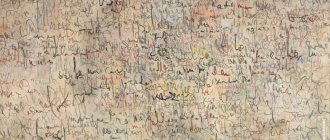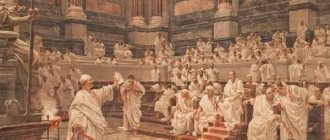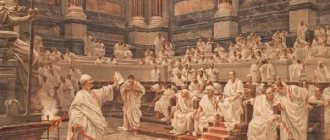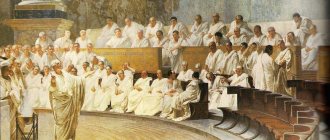The art of eloquence: 10 rules of Cicero
Marcus Tullius Cicero (106 - 43 BC) was not an aristocrat. He came from the class of horsemen, not endowed with power from birth. To find himself in the Senate, Cicero used his only weapon, which in the ancient world sometimes surpassed wealth and personal connections - oratory. He studied in Greece and rhetorical schools of Asia Minor, studied Demosthenes, Plato, and read Pericles and Aristotle - the best rhetoricians of antiquity. In Rome, he observed the work of theater actors and understood how to excite the feelings of listeners.
By the age of 35, a master of political and judicial eloquence, Cicero became the first orator of Rome. His art opened his path to politics. He took the post of quaestor, then aedile and praetor. After this, Cicero rose to the top of the formal republican hierarchy - the people elected him consul. In this capacity, the eloquent Cicero committed in 63 BC. e. the main political matter of his life. When Catiline's conspiracy was discovered (the aristocrats wanted to take power by force), Cicero prevented the coup with a word - he read four speeches against the conspirator in the Senate and convinced the assembly not only to overthrow Catiline, but also to execute him without due judicial procedures.
Cicero makes a speech in the Senate against Catiline. (Pinterest)
“Oh times! O morals! The Senate understands everything, the consul sees everything, and this man is still alive and well! Lives? Yes, if only that! No, he appears in the Senate, becomes a participant in state councils, and at the same time with his own eyes he outlines and appoints each of us to the slaughter. What about us? What are we doing, the support of the state? Do we really see our duty to the republic in avoiding his furious attacks in time? No, Catiline, you should have been sent to death long ago by consular order, to turn the destruction that you have hitherto been preparing for all of us against you alone...”
From Cicero's first speech against Catiline, delivered in the Senate
However, Cicero's political star quickly faded. He not only failed to stay in the Senate and in Rome in general (because of Caesar), but in principle he had to leave the political arena for a long time. The Republic he defended has fallen. His political program - the unity of the estates - completely failed. When Cicero’s voice sounded loud again, this time against the despot Mark Antony (the speaker read about 20 strong speeches against him), he eliminated him in the most rude manner: he sent assassins. An elderly republican and philosopher had his head cut off.
Fulvia with the head of Cicero, fragment of a painting by P. Svedomsky. (Painting Valley)
According to legend, Antony's wife Fulvia stuck pins into the tongue of Cicero's severed head, and then the head was hung on the rostra in the Forum. True, political murders did not save Anthony from a sad outcome - political and military defeat, and then suicide. And if he remained in history only as Cleopatra’s lover, an unpleasant politician and an opponent of Octavian, then Cicero occupied a much larger place in it. The orator forms an important part of the heritage of ancient Roman culture. His speeches are the best examples of Latin of the 1st century BC. e., his treatises are a reflection of ancient Roman political and legal philosophy.
Some of Cicero's works are original manuals on oratory. The main ones, “De oratore” (“About the speaker”) and “Orator” (“The speaker”), he wrote in his declining years, and included all his knowledge in them. Cicero's main instructions and reasoning can be summarized in 10 points.
Cicero. (Brewminate)
1. “The speaker must have a philosophical education”
In order to influence a person’s soul with a word, one must know it, and for this one needs philosophy: “All the power and art of eloquence must be manifested in order to either calm or excite the souls of listeners.”
2. “The speaker must have a scientific education”
Science is needed, because without knowledge, “fluency in words is meaningless and ridiculous.” The speaker should know history in order to “draw examples from it,” and also know the laws, for “ignorance of the law is shamelessness” (here in Cicero the Roman sense of civic duty speaks). If the subject of speech is related to other sciences, the speaker should consult with the best in this matter and study the issue so that it seems that the speaker understands it better than specialists.
3. Memory
The speaker must improve the “treasury of all knowledge”
4. “The speaker must master all three styles of speech”
Ancient eloquence knew three styles - simple (serves only for persuasion), medium (also for the delight of the listener) and high (with its help the speaker excites and captivates the audience).
5. "The Plan"
According to Cicero, “one cannot be confined to one style.” A real speaker acts flexibly and always makes a plan - he knows “what to say, where to say and how to say”; he knows how to choose a style for each situation, choose beautiful words and arrange them correctly in a speech (for example, put his strongest arguments at the beginning and at the end so that they are better remembered).
6. Rhetorical technique
Only someone who knows how to calculate the audience's reaction to words and their order can give a good speech. Even silence is a compositional device. The speaker must quickly attract the listener at the beginning of the speech, present everything clearly and concisely, argue his point of view and refute the opposing one, and then conclude everything with an emotional conclusion.
7. Acting
No wonder Cicero admired Roscius and other actors. True eloquence also requires acting, since feelings convince people even better than rational arguments. Cicero was excellent at evoking compassion and anger, passion and delight, disgust and fear... He remembered gestures, the sound and tone of his voice, the expression of his face.
8. Rhythm
Speech is a work of art. Cicero's innovation lies in the fact that he introduced poetic artistry into speech. “The pleasantness of rhythms,” he believed, “is as important as the pleasantness of words.” For example, you can repeat one word or syntactic structure in some part of speech, or maintain a certain pace, or list objects abruptly, without conjunctions. In the same way, you can give ri - hints, transitions, illustrations, contrasts...
9. Laughter
The obvious rule. A joke makes any speech, except a solemn one, more interesting and convincing. Cicero knew how to make people laugh until they cried. But he also warned that the speaker must use humor sparingly and “avoid clownish wit in every possible way.”
10. Gifting
Without natural talent you cannot become a speaker. Cicero believed that those who were not capable of eloquence should speak directly about it. The rest should not be disturbed, and special talents must be supported with all our might.
[edit] List of works
Note. The sign (r) marks works translated into Russian; sign (rf) - fragmentary Russian translations
[edit] Philosophical and political treatises
- Academica (Academics [Teaching of the Academicians]; preserved in fragments; 45) (r) Academica priora (first edition of “Academics”): 1st lost part of Catulus (Catulus), 2nd preserved Lucullus (Lucullus)
- Academica posteriora (second edition of “Academics”)
[edit] Rhetorical treatises
Note. The date of creation is indicated in brackets
- De inventione (On finding <material>; between 85 and 80) (rf)
- De oratore (About the speaker; 55) (r)
- De partitione oratoria (Construction of speech; 54)
- De optimo genere oratorum (On the best kind of orators; 50 or 46) (r)
- Brutus (Brut; 46) (r)
- Orator (Speaker; 46) (r)
- Topica (44) (r)
[edit] Speeches
Note. The date of creation is indicated in brackets
- De domo sua ad pontifices (About your house, to the pontiffs; 57) (r)
- De haruspicum responso (On the answers of the haruspices; 56) (r)
- De imperio Cn. Pompei (Pro lege Manilia) (On the command of Gnaeus Pompey, or In defense of the Manilian law; 66) (r)
- De lege agraria (Contra Rullum) (On the land law, or Against Publius Servilius Rulla; 63) (rf)
- De provinciis consularibus (On the consular provinces; 56) (r)
- De Sullae bonis (66; speech lost)
- Divinatio in Caecilium (In Q. Caecilium) (Against Quintus Caecilius Niger; 70) (r)
- In L. Calpurnium Pisonem (Against L. Calpurnium Pisonem; 55)
- In Catilinam I-IV (Four speeches against Catiline; 63) (r)
- In P. Vatinium (Against Publius Vatinius; 56)
- In Verrem actio prima (Against Guy Verres. First session; 70) (r)
- In Verrem actio secunda I-V (Against Gaius Verres. Second session; 70) (rf)
- Oratio cum populo gratias egit (Speech to the people upon return from exile, 57) (r)
- Oratio cum senatui gratias egit (Speech in the Senate on the return from exile, 57) (r)
- Philippicae orationes I—XIV (Philippics; 14 speeches against Mark Antony; 44-43) (rf)
- Pro Aemilio Scauro (In defense of Emilius Scauro; 54)
- Pro T. Annio Milone (In Defense of Titus Annius Milo; 52) (r)
- Pro Archia (In Defense of Archia; 62) (r)
- Pro A. Caecina (In defense of Aulus Caecina; between 71 and 69)
- Pro M. Caelio (In Defense of Marcus Caelius Rufus; 56) (r)
- Pro A. Cluentio Habito (In Defense of Aulus Cluentius Habitus; 66) (r)
- Pro L. Cornelio Balbo (In Defense of Lucius Cornelius Balbo; 56) (r)
- Pro P. Cornelio Sulla (In Defense of Cornelius Sulla, 62) (r)
- Pro M. Fonteio (In Defense of Mark Fonteio; 69)
- Pro Q. Ligario (In Defense of Quintus Ligarius; 46) (r)
- Pro M. Marcello (Regarding the return of Marcus Claudius Marcellus, 46) (r)
- Pro Murena (In Defense of Murena; 63) (r)
- Pro Cn. Plancio (In Defense of Gnaeus Plancius; 54)
- Pro P. Quinctio (In Defense of Publius Quinctius; 81) (r)
- Pro C. Rabirio perduellionis reo (In defense of Gaius Rabirius; 63) (r)
- Pro Rabirio Postumo (In defense of Gaius Rabirius Postumus; between 54 and 52)
- Pro rege Deiotaro (In defense of King Deiotaro; 45)
- Pro Sex. Roscio Amerino (In Defense of the American Roscius; 80) (r)
- Pro Q. Roscio Comoedo (In defense of the actor Roscius; 77 or 66; preserved in fragments) (r)
- Pro P. Sestio (In Defense of Publius Sestius; 56) (r)
- Pro M. Tullio (In Defense of Marcus Tullius; 72-71)
- Pro L. Valerio Flacco (In defense of Valery Flacco, 59) (r)
[edit] Letters
- Epistulae ad familiares (Letters to loved ones; 16 “books”) (r)
- Epistulae ad Quintum fratrem (Letters to Brother Quintus; 3 books) (r)
- Epistulae ad M. Brutum (Letters to Marcus Brutus; 2 books) (r)
- Epistulae ad Atticum (Letters to Atticus, 16 books) (r)
[edit] Partially preserved and lost
- Plato's Timaeus (first Latin translation, fragmentary surviving)
- De consiliis suis (“About my <political> plans”, not preserved)
- Carmina Aratea (poetic translations of Aratus from Sol; fragments) Phaenomenon (from "Apparitions")
- Prognosticorum (from "Signs of the Weather")
Fragments of poetic works, speeches, translations of Greek literary and philosophical works, and sketches of his own books have been preserved.
[edit] Attributed
- Rhetorica ad Herennium (Rhetoric to Herennius, 80s BC; the oldest Latin textbook of rhetoric; recognized as anonymous, but traditionally published in the corpus of works of Cicero)
- In Sallustium (Speech against Sallust Crispus)
Cicero vs Mark Antony
Cicero wrote as many as fourteen speeches against Mark Antony, who killed Caesar. These speeches were called “Philippics”, because. were very similar to the speeches of Demosthenes, who spoke out against the Macedonian tyrant, King Philip.
In his speeches “Against Mark Antony,” Cicero called on the Senate to defend the freedom of the republic against the heir of Caesar. But later, Mark Antony and his supporters created a second triumvirate, and the Senate simply became unable to resist, which is why Cicero was included in the list of outlaws and later killed. But the fame of Cicero not only did not sink into oblivion, but was able to overcome centuries.
Cicero vs Catiline
However, the period when Cicero was consul deserves special attention - it was during this time that he managed to expose Catiline’s conspiracy, and also spoke out against him with numerous speeches.
For reference, we note that Catiline was a member of the Senate, and took his origins from a noble patrician family. He conceived his plot during the election struggle for consular power, and this struggle was between him and Cicero. Catiline was able to attract a considerable number of people from various social strata to his supporters, and his main slogan was the demand to cancel old debts.
Catiline's entire political campaign was uncertain, but had as its main goal the seizure of power. Cicero, being consul, organized an emergency meeting of the Senate, which, of course, included Catiline. At this meeting he made his first speech “Against Catiline.”
This speech was extremely effective and successful and complied with all oratorical rules. Cicero described the actions of the attackers and the personality of Catiline in rather gloomy colors. He called him “an enemy of the fatherland” and added many unpleasant epithets to this. The main demand for Catiline was to leave Rome, which he did not hesitate to do at the end of the meeting.
Over the next few days, Cicero made three more speeches against the enemy before the Senate and the people, and then published all four speeches. However, the success of the speeches, which helped expose the conspiracy, did not allow the consul to remain in Rome. So, after the expiration of consular powers, Cicero had no choice but to become an exile, because the discontent of Catiline’s supporters was growing, which threatened Cicero with execution without trial.
Cicero vs Verres
Initially, in the speeches and writings of Cicero, the interests of the equestrian class prevailed, to which, in fact, he himself belonged from birth, and he opposed the Roman nobility. This can be judged by his speeches directed against Verres, who was the former governor of Sicily and plundered the country. The inhabitants of this province themselves asked Cicero to oppose the profit-hungry man. Cicero prepared for the trial in the most thorough manner, collecting a huge amount of factual material, looking for witnesses, and then acting as an exposer of the criminal acts of the former governor.
Already during the first court session, Cicero made two speeches that forced Verres to plead guilty, and the matter did not even come to the second session. But the accuser did not stop, and all seven speeches “Against Verres” were published, outlining in detail all the predatory behavior of the villain, as well as the arbitrariness of the governors who ruled the provinces, and mutual responsibility within the Roman nobility, i.e. nobility
Over time, Cicero began to side with the Senate party, directing all his efforts to reconcile the warring classes.
Literary legacy and significance of Cicero
Cicero, as we just mentioned, is considered the founder of Roman classical prose. The language of his speeches, letters and treatises is the norm of classical Latin. The style of his prose works was appreciated by critics of Antiquity, and the works themselves became exemplary.
The letters written by Cicero formed the basis of European epistolary culture, and the speeches, mainly the Catilinaria (the "Against Catiline" speeches), are among the most prominent examples of the genre.
Humanistic prose also, in the process of its formation, took the language of Cicero as a basis. Even in the 18th century, prominent French revolutionary politicians took the rules and techniques of Cicero as the basis for their eloquence.
Cicero's treatises on philosophy can be called a unique presentation of the entire philosophy of his era, and today data is drawn from them on many aspects of life in Rome in the 1st century BC.
After himself, Cicero was able to leave a voluminous literary legacy, most of which can be found today. This includes his literary works: more than eight hundred letters, several treatises and 58 speeches.
We also recommend reading:
- Storytelling
- Aristotle's rhetorical concept
- Lessons of Wisdom from Cicero
- Aristotle complex
- How Demosthenes became an orator: the unusual story of the great master of speech
- Pros and Cons of Pros and Cons Lists
- Preparing for a Public Speaking
- Mnemonics: how to remember people and everything connected with them?
- Marcus Fabius Quintilian: on the education of an orator
- Development of speech culture
- Preparing and delivering a speech
Keywords:1Storytelling
Personal life
Cicero's personal life turned out to be difficult. The philosopher married twice. Marcus Tullius lived into old age with his first wife, Terence. The girl came from a respected family. Terence gave birth to two children for Cicero. The girl Tullia died at a young age. Later a son, Mark, appeared. After 30 years, the marriage broke up.
Busts of Cicero
At the age of 60, Cicero married again. Publius's wife was younger than her husband, but this did not interfere. The jealous girl was not satisfied with the philosopher's relationship with his daughter, so Cicero soon left the family.
There were rumors that Sister Claudia sought to marry a politician. The speaker is the eldest child in the family. Brother - Quint.
Death
After the death of Caesar, Cicero was placed on the proscription lists for constant attacks on Antony. Thus, the philosopher becomes an enemy of the state. The property was confiscated. In addition, a reward was announced for the murder or extradition to the government of Cicero.
Mark Antony
The speaker managed to find out about what happened at the time of communication with Quint. First, Cicero and his brother went to Astura, and then wanted to stop in Macedonia. The brothers did not have time to stock up on things for such a trip. As a result, Quintus decided to stay and pack his bags, and Cicero had to move on.
Quint was unable to catch up with the politician because he was killed. Cicero hastened to escape on the ship. Later, Marcus Tullius came down to earth and began to rush about, looking for salvation. As a result, he returns to Formia, to his personal villa. Suddenly, crows appeared at the windows and pulled the cloak off the philosopher’s face. The slaves tried to help the man and carried him on a stretcher to the sea.
Death of Cicero
The killers arrived in time - the centurion Herennius and the military tribune Popillius. The worker told where Cicero was taken. Seeing this, the speaker ordered the slaves to stop. Marcus Tullius looked at the killers in his favorite pose, and then allowed himself to be killed. The philosopher was stabbed to death, his head and hands were cut off for writing speeches against Anthony.
Political Views
Cicero was a staunch supporter of the preservation and strengthening of the “Senate Republic”, based on the “testaments of the ancestors.” He called his main works “On the Republic” (De re publica; more often translated “On the State”) and “On the Laws”; both works are written in the form of dialogues.
The state is the property of the people, and the people are not any union of people gathered together in any way, but a union of many people connected by agreement in matters of law and community of interests.
The main advantages of the definition of the concept of “state” are:
- A people is a special community of people;
- The people are considered as a spiritual and social community of people united by common ideas about law and common interests;
- Law is seen as the basis for the unification of the people, whose “property” is the state.
Biography
The politician, philosopher and orator Marcus Tullius Cicero lived in Ancient Rome. The Roman did not come from a noble family, but with his oratorical talent he managed to reach unprecedented heights in his political career. Marcus Tullius remained a supporter of the republican system until the last, for which he paid with his life. Some literary, philosophical and oratorical works of the figure have survived to this day. Cicero's contemporaries believed that the philosopher had a standard narrative style.
Portrait of Cicero
The work of Marcus Tullius influenced the formation of ancient Roman culture. Cicero's treatises and speeches delighted historians of different times. Researchers draw important conclusions based on the works of the philosopher.









